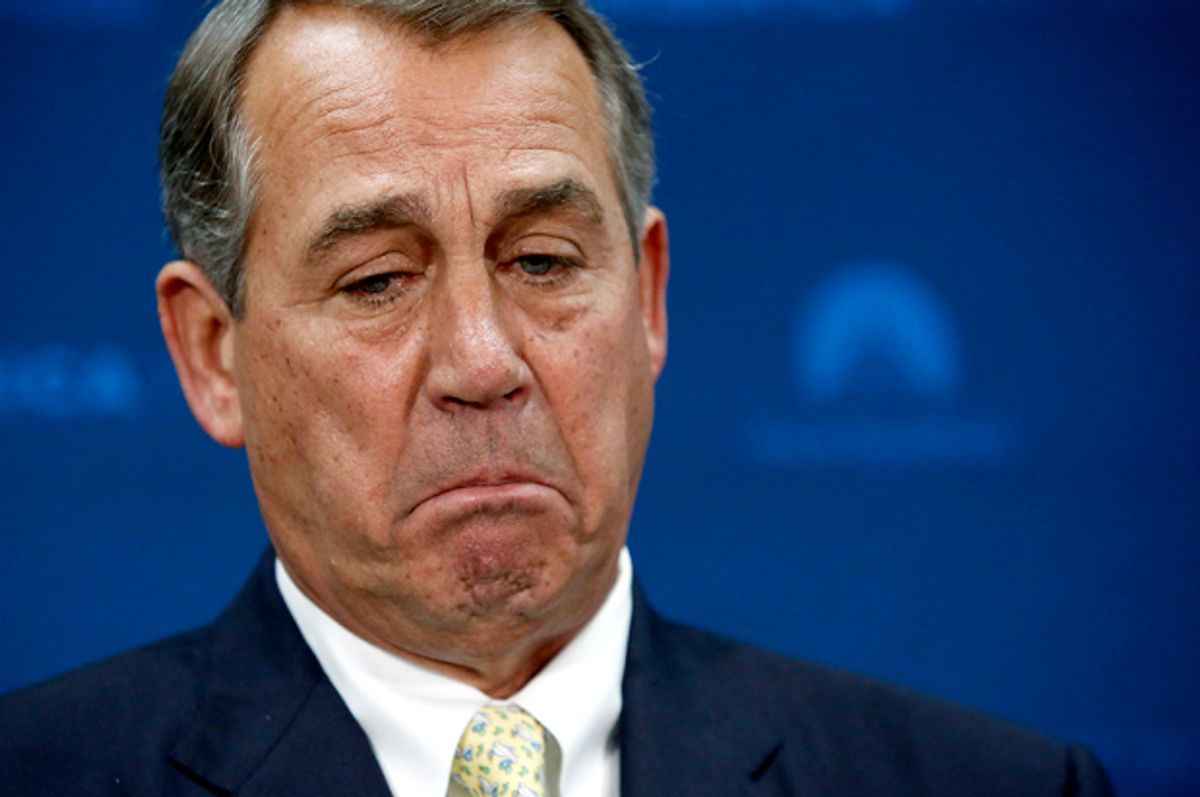President Obama is in a far from ideal position when it comes to immigration. He's made a promise to immigration activists to take executive action on deportation and other aspects of the immigration system before the end of the year -- a promise that he's already broken once. But his party has also just lost an election, badly, and he's once again facing temptations from Speaker John Boehner and incoming Senate Majority Leader Mitch McConnell to table his plan in order to achieve legislative immigration reform next year. Boehner and McConnell have no actual intention of pushing through immigration legislation next year, but Obama's action would given them cover -- they wanted to do it, but he "poisoned the well." Hurt feelings are now an acceptable pretext for dropping plans to pursue important legislation, a sourpuss play one might call "the Lindsey Graham."
This can't be all that fun for the president. But his choice basically boils down to a) do the executive action and have (most) Democrats like you but Republicans hate you or b) don't do the executive action and have everyone hate you. The idea that Obama would drop his plans and suddenly Mitch McConnell and John Boehner would be all, Gee golly, thanks, Mr. President, Sir, we'll get going on immigration reform right away, now that we're all such good chums, is about as ludicrous as it gets.
But there's another play for the president that's beginning to float around, something that might allegedly pin the onus back on Boehner. It comes most notably from the president's former campaign strategist and close adviser David Axelrod:
[embedtweet id="530087479081455617"]
There are many reasons to believe that Boehner's response to this swap would be a resounding "no." Chief among them: He's already said as much:
[embedtweet id="530426828205604864"]
Boehner is most likely to say "no" to this proposal because the whole point of being a Republican in the age of Obama is to say "no" to anything President Obama suggests. Boehner can also say that his party just won tons of seats in both the House and Senate and it would violate the Will of the People to vote on major legislation like this in the lame-duck, before the Gang of Eight bill that passed in the Senate last year expires. Why would he hold a vote on a bill that includes l'Amnesty after his party's just won a ton of seats running viciously against that? The only benefit that the White House would get out of that proposal is a messaging one: to remind people that House Republicans have been blocking immigration legislation.
Let's entertain the notion of Boehner saying "yes" to this swap, though. Axelrod, and other proponents, seem to be relying on a logic that pervaded much of the 113th Congress: that if Boehner brought the Gang of Eight bill to the floor, it would easily pass, as most or all Democrats would join up with a couple dozen GOP "moderates" and send the thing to the president's desk. And this was precisely why Boehner couldn't bring the bill to the floor.
This seems dated.
The GOP of late 2014 is a different beast than the GOP of early 2014 when it comes to immigration. There probably were just enough immigration doves in the House Republican ranks to join up with Democrats for a majority on a Gang of Eight-style comprehensive approach, in which Democrats trade over-the-top border security for a gradual path to citizenship for those already here.
But then midterm base-fanning politics kicked into gear. House Majority Leader Eric Cantor, who had maybe said one nice thing about comprehensive immigration at some point in his life, lost his primary to David Brat. Various other Republicans in the House and Senate only survived their primaries by turning hard-right on immigration. The "border crisis" (remember that?) happened, bringing GOP anti-amnesty rhetoric to all-time highs.
The pressure that did exist on the GOP to pass comprehensive immigration reform came from "business wing" entities like the Chamber of Commerce. But Republicans called the Chamber's bluff early on: Candidates went hard against comprehensive immigration reform in both primary and general elections, and the Chamber kept the money flowing anyway.
All of which is to say that if Boehner said "yes" to the swap, the Gang of Eight bill would probably get voted down more or less along party lines. Even if, as a useless exercise, the bill were put up for another vote in the Senate, it might not muster 60 votes there either. Lindsey Graham and Marco Rubio, for example, have already walked away from the bill they wrote. (And if John McCain plans on running for reelection again, we're sure to see a return to 2010-style, hard-right, "complete the danged fence" John McCain. This will be a whole other comedic side-note that we can enjoy for the next couple of years.)
If there's one thing you can bet on, it's that John Boehner and his conference have no intention of helping President Obama get out of this corner he's in by passing meaningful bipartisan legislation. What would be the fun in that?
This situation seems destined to end with the White House splitting the baby in half. The president will keep his promise to act but won't go as "big" as he could. He'll delay deportations for a narrow slice of of the 5 or so million that he could, and he'll try to play up whatever border security enhancements he's also taking in selling it to the public. There will be some bureaucratic rejiggering of green card caps that wins him backup from big business. He'll expect to get heavy flak from both immigration activists and conservatives, hoping that it positions him as the reasonable centrist representing the silent majority of reasonable centrist Americans. It would be the classic "if both sides hate me, I must be doing something right" logic, which has never made much sense.

Shares